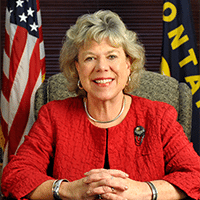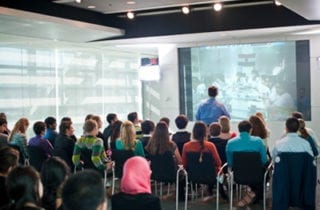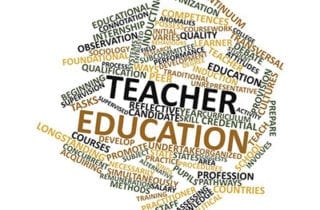As the first on her father’s side to finish high school, and after ten years becoming the first on her mother’s side to graduate college, a sense of initiative served as the foundation to Secretary McCulloch’s career. After graduating, she began teaching and at the same time became involved in campaign work. “Have you ever wanted something but thought if you said it out loud it would sound foolish?” said Secretary McCulloch, describing her initial thoughts about becoming an elected official. She now admits she was embarrassed to ever have thought that. “As women, we constantly underestimate our abilities. We are our own worst critic when we should be our number one cheerleader,” she said.
All over the world, destructive ideologies based on cultural, religious, and ideological stereotypes are hampering development, dialogue, and understanding of the world around us. Generation Global believes that education is one of the most effective instruments in countering these ideologies. Through Generation Global, students can practice skills and dialogue, participate in facilitated videoconferences, and engage in a safe online community where they can connect with their peers around the world.
To provide the best possible teaching and learning environment, school leaders need to provide their teachers with professional learning opportunities that are personalized and engaging. This is not an easy task when there are so many areas to cover, very little time, and limited funds. edWeb.net is free and can help school leaders provide teachers with personalized PD that meets teachers’ needs and interests, and promotes collaborative learning with peers. Shannon Holden, Assistant Principal at Republic Middle School, MO, provides a guide for school leaders to demonstrate how edWeb.net can be used in any school or district.
Dr. Douglas Fisher, Professor of Educational Leadership at San Diego State University, presented in the webinar, “Rigorous Reading: Building Strength and Stamina,” sponsored by Achieve3000. The webinar explored building strength and stamina in students to improve reading at increased difficulty and complexity. Dr. Fisher began by defining the difference between difficulty and complexity, explaining that difficulty is the amount of effort a student must put into a given task, whereas complexity is the kind of thinking students must do for that task. It is fundamental that teachers maintain the balance between difficulty and complexity to foster an effective literacy program. They can do this by assigning their students many tasks that provide varied levels of each.
Learning Ally sponsors the free Professional Learning Community (PLC) on edWeb, Empowering Struggling Readers. This PLC provides webinars and resources that help support students with dyslexia and specific learning disabilities. Here, educators, administrators, special educators, curriculum leaders, and librarians can collaborate on how to make thriving students out of struggling readers. Empowering Struggling Readers also provides insight on assistive technology, accommodations, and overall solutions to foster academic success and a love of reading in students.
Since he began teaching in 1997, Holbrook has been interested in the use of technology to facilitate learning in the classroom. Unimpressed with the online platforms provided by the university, Holbrook found out about edWeb through a colleague and was immediately pleased with the wealth of opportunity for collaboration and discussion. edWeb makes collaboration outside the classroom simple for Holbrook’s busy doctoral students, many of whom also balance families and full time jobs.
Rachel Langenhorst, K-12 Technology Integrationist and Instructional Coach in Rock Valley, Iowa, presented an edWeb.net webinar on “Implementing a Personalized PD Program in Your District” where she provided a guide for how educators can use edWeb in school districts as a tool to implement relevant and collaborative PD.
Anna Wilmoth, Marketing Director at Gryphon House, recently presented in the webinar, “Integrating Social, Email, and Content Marketing with edWeb,” co-hosted by edWeb.net and MCH Strategic Data. Anna discussed how Gryphon House uses edWeb to their expand marketing outreach in order to build stronger relationships with educators and provide them with professional learning. She began her presentation discussing how webinars fit into a marketing plan. First, webinars expand reach by partnering with companies that already have an established audience and marketing network. Webinars also build stronger relationships with customers by providing additional value, giving companies a competitive advantage.









